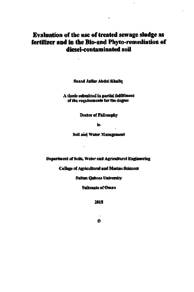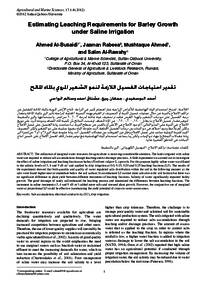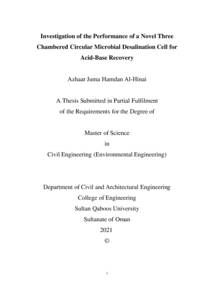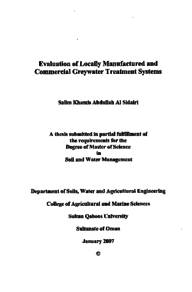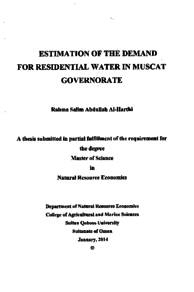وثيقة
Evaluation of the use of treated sewage sludge as fertilizer and in the Bio-and Phyto-remediation of diesel-contaminated soil
الناشر
Sultan Qaboos University
ميلادي
2018
اللغة
الأنجليزية
الموضوع
الملخص الإنجليزي
It is well-recognized that management of wastewater and sludge is a critical environmental issue in many countries. A regular and environmentally-safe wastewater treatment and associated sludge management requires the development of realistic and enforceable regulations as well as treatment systems appropriate to local circumstances. Furthermore, treated wastewater and sludge development should encourage the revision of existing standards, regulations, and policies for their management in the Sultanate. Many studies have been conducted on reusing treated wastewater as a beneficial source in Oman, but little research has been carried out on using sewage sludge.
The objectives of this research are to compare the current Omani legislation with international legislations like World Health Organization (WHO) and United States Environmental Protection Agency (US-EPA) in terms of treated wastewater reuse for agricultural purposes and with European Guidelines (EU) and US-EPA in terms of sludge application reuse to recommend any necessary implementation of amendments and modifications to the national regulations. Moreover, the effect of composted sewage sludge (Kala compost) was investigated to reduce hydrocarbons from diesel contaminated soil by applying phytoremediation and bioremediation methods. Phytoremediation was used by means of Bermuda grass and Ryegrass and bioremediation was carried out using isolated microorganisms. Lastly, the effective application of Kala compost and inorganic (NPK) fertilizers on soil quality and on two crops (Radish and Beans) was studied.
The study revealed that the national regulations are considered to be too general and a number of recommendations have been made to the decision-makers to consider modifying the guidelines in Oman. The remediation of diesel-contaminated soil showed that 77% removal of Total Petroleum Hydrocarbons (TPH) in the phytoremediation method was achieved when 10% of Kala compost was applied in contaminated soil cultivated with Bermuda grass compared to Ryegrass. The isolated strains in the bioremediation method were Bacillus genera which belong to degradable diesel strain categories which had shown their capabilities to degrade diesel fuel up to 66% after incubation for one week and 90% after incubation for two weeks, especially when 1% Kala compost was added to the treatment. In addition, their concentration dropped from 87 to 29 mg of alkanes/g soil in the same treatment. These strains are considered as halotolerant and mesophilic, which can grow in coastal sediments where the salinity could reach up to 10% of NaCl concentration, and can survive in the Omani hot summer months where the temperature reaches up to 55°C. Finally, Kala compost showed its efficiency in producing higher crop yields of Radish and Beans compared to NPK fertilizers in the agricultural experiment. Moreover, chemical analysis of soil and the two crops did not show any risk of heavy metal accumulation.
In the area of treated municipal wastewater and sludge management in the Sultanate of Oman, the experiments showed the efficiency of using municipal composted sewage sludge (Kala compost) for enhancing the remediation of diesel hydrocarbon contaminated soil and using it as organic fertilizer in agricultural activities.
المجموعة
URL المصدر
الملخص العربي
شهدت السلطنة في الآونة الأخيرة كغيرها من الدول، نموا مضطردا في عدد السكان واكبه نموا وتطورا هائلا في التنمية الزراعية والاجتماعية والاقتصادية، وقد نجم عن ذلك ازديادد في الطلب على المياه النقية والصالحة للشرب لمواكبة مقومات التنمية. ففي ظل هذا التسارع كان من الضروري استخدام بدائل أخرى للمياه النقية خشية استنزافها ونضربها، كاستخدام مياه الصرف الصحي المعالجة في الكثير من المشاريع التنموية عليه، وبهذا الخصوص تم تنفيذ مشروع إقامة محطة الصرف الصحي المعالجة في مسقط والتي تنفذها شركة حيا للمياه وفق أسس ومعايير عالمية بغية استخدامها لمشاريع التنمية في البلاد. ولتحقيق الإدارة المتكاملة لاستخدام المياه المعالجة والحمأة الناتجة بعد عمليات المعالجة، كان من الضروري استخدام الضوابط والمعايير المثلى لتطبيقها. تهدف هذه الدراسة إلى مقارنة الضوابط المعتمدة للسلطنة في إدارة مياه الصرف الصحي والحمأة الناتجة عنها بتلك المعايير المستخدمة في كثير من دول العالم، ومن ثم الاقتراح إذا ما كانت هذه الضوابط صالحة لاستخدامها الآن أو العمل على تطويرها وفق ما يتطلبه الوضع الراهن في التطور الهائل التي تشهده بلدان العالم. كما هدفت الدراسة إلى معرفة صلاحية السماد العضوي (الكلا) والتي تنتجه شركة حيا للمياه من الحماة المستخلصة من عمليات معالجة مياه الصرف الصحي في التسارع لمعالجة التربة الملوثة بالزيت بجانب الأعشاب الممتصة للملوثات الهيدروكربونية والكائنات الحية الدقيقة، واخيرا استخدامه للأغراض الزراعية ومعرفة مدى جودته للحصول على إنتاج الوفرة لمحصولي الفجل الأبيض واللوبيا وتأثيره على التربة الزراعية بمقارنته مع السماد الغير عضوي (NPK ) أثناء استخدام ري التربة بمياه الصرف الصحي المعالجة والمياه الجوفية. ولتحقيق أهداف هذه الدراسة، فقد تم تقسيم العمل فيها إلى قسمين، القسم الأول قسم نظري و تم فيه مقارنة معايير استخدام مياه الصرف الصحي المعالجة بمعايير منظمة الصحة العالمية (WHO) و الوكالة الدولية لحفظ البيئة ( US - EPA )
قالب العنصر
الرسائل والأطروحات الجامعية

